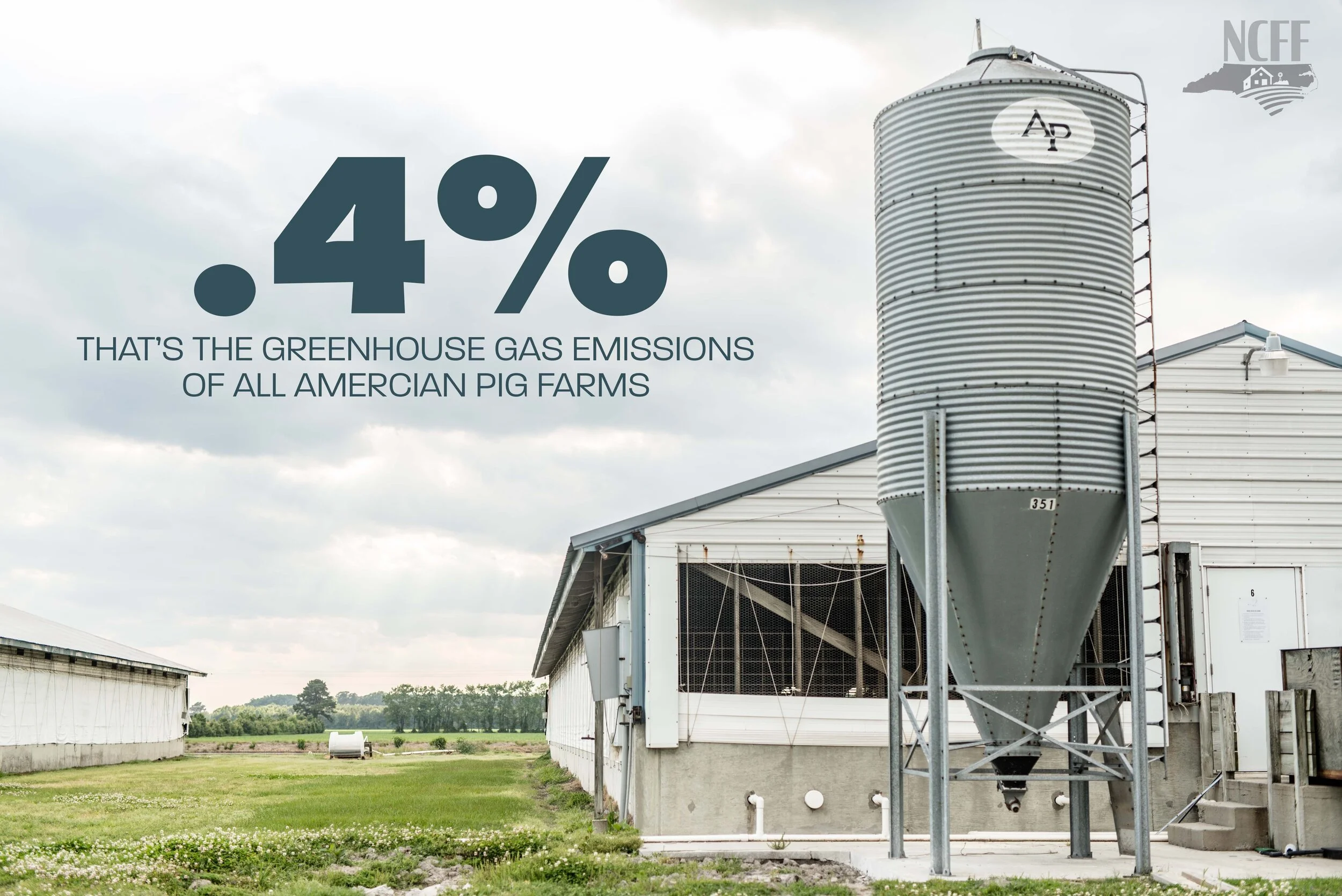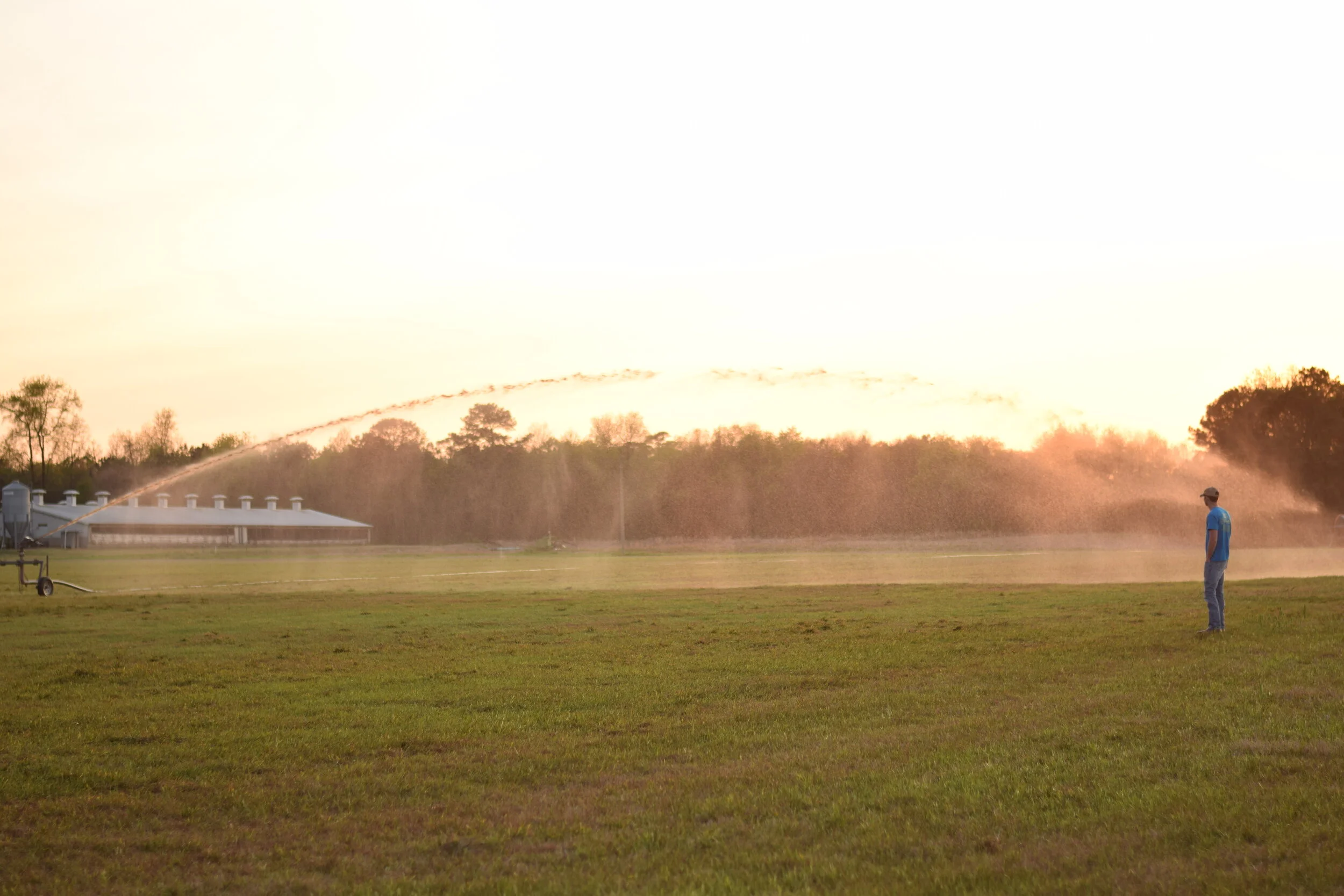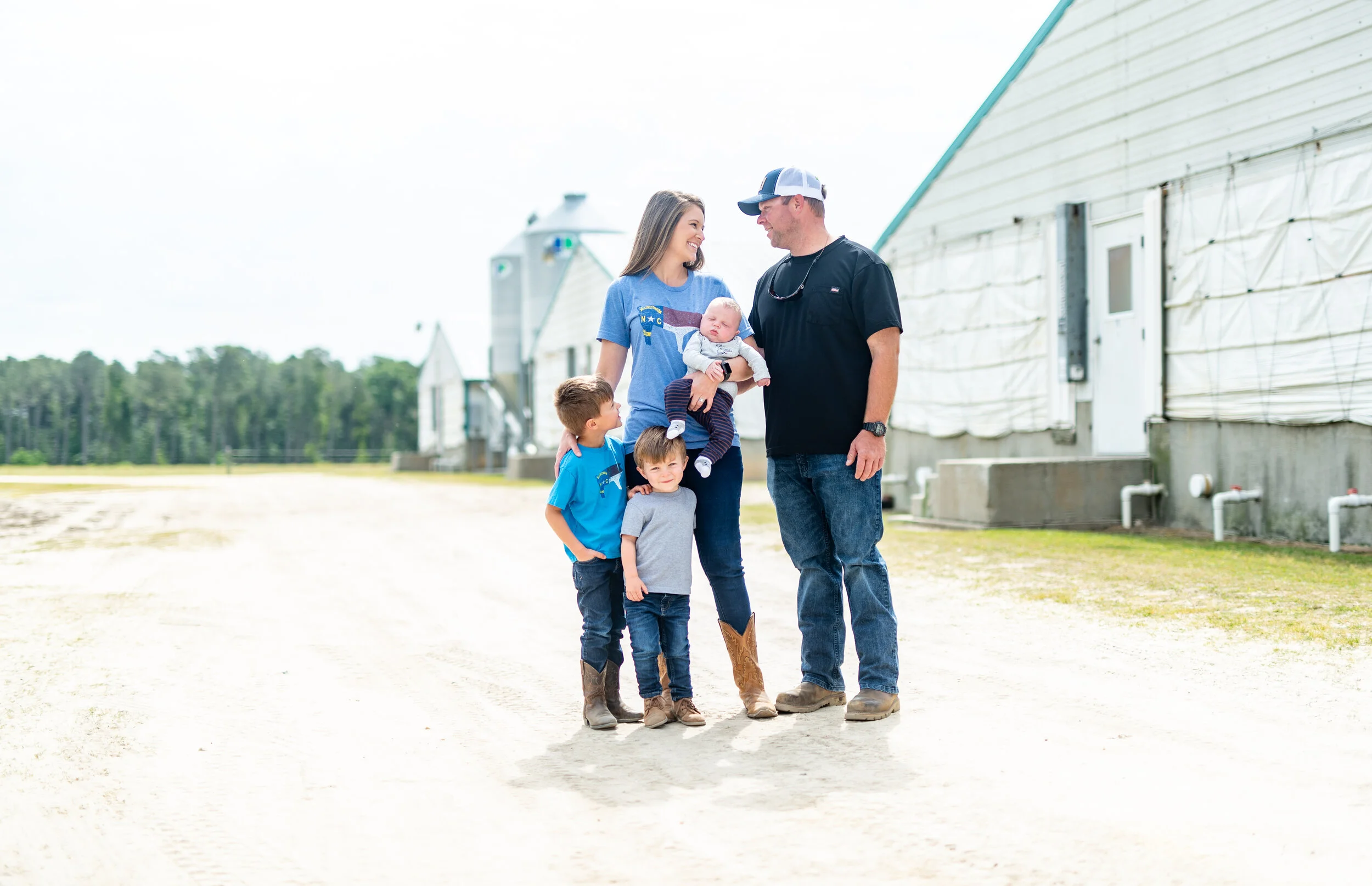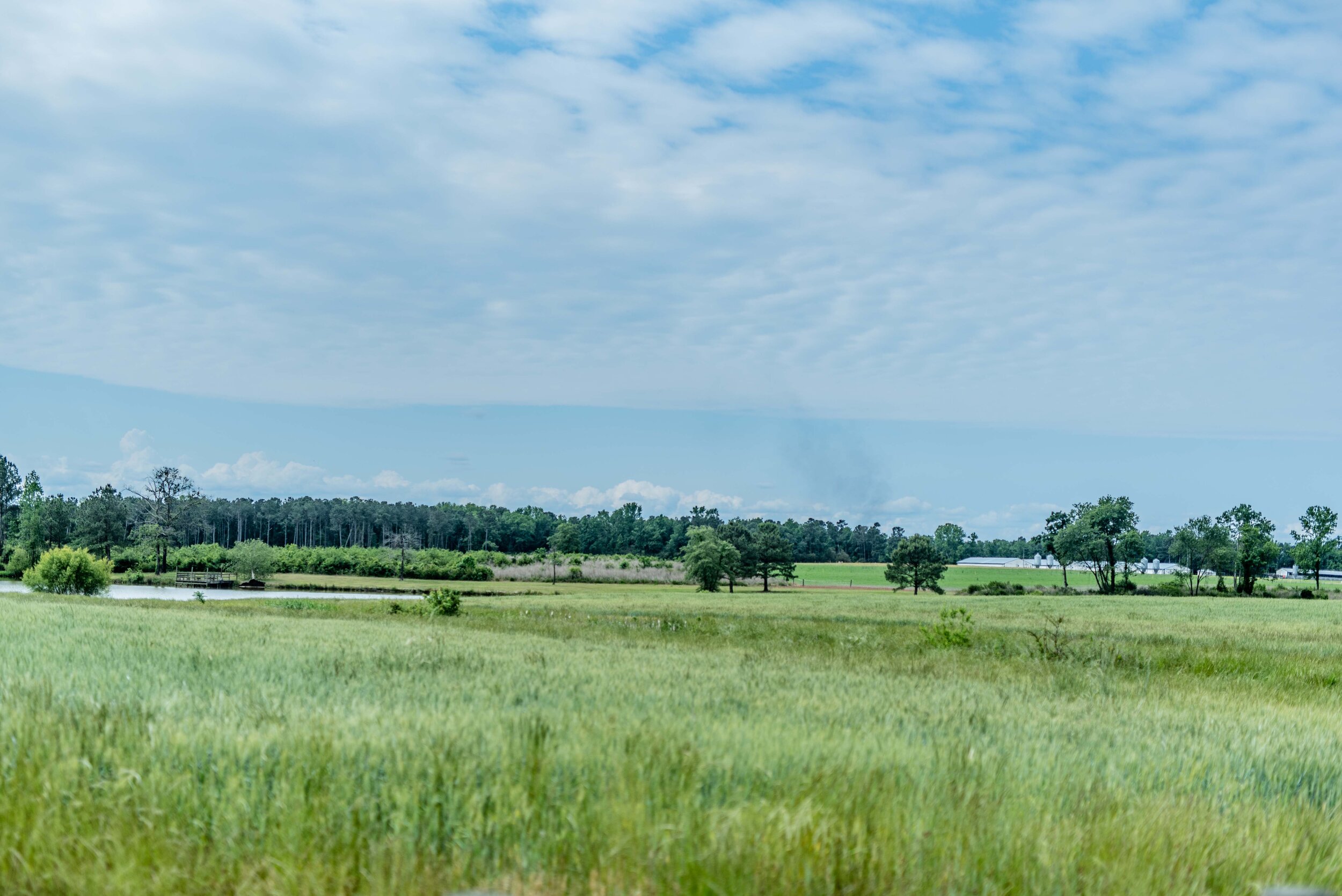Farmkeepers Blog
The Farmkeepers is the official blog of NC Farm Families. It is here that words will flow, our voice will be heard, a stand will be made, and the farm families of North Carolina will be protected. In these posts, we'll set the record straight. You'll see the faces of the families who feed us. Here, you'll receive all the updates and news. It is here that we will fight for farmers and be the keepers of the farm in NC. We hope you'll join us. Follow along on social media and by joining our email list.
Pig farmers reduce environmental impact | Activists push back
Greenhouse gas emissions (GHG) are a national (and global) concern, with blame being directed everywhere from fossil fuels to cow farts. Included in the blame game, at least in North Carolina, are pig farms.
Terms like “toxic,” “polluters,” and “cesspools” have been used to describe pig farms in North Carolina. According to activists, they really have a problem with how we handle manure. They view the lagoon and spray field system as an “antiquated” method that needs to be abolished. Activists have sued over “odor” and effectively shut down several farms. In these lawsuits, they never requested a change in the system (just millions of dollars) but did highlight alternatives that could be implemented.
Fast forward to recent months. Farmers have been working together with Dominion Energy and Smithfield Foods to implement years of research to cover lagoons, capture methane, and turn it into renewable natural gas, which in turn, produces electricity. Note, this was one of the alternatives encouraged by activists in court. Now they oppose it, with claims that it may make things worse.
Confused? Get ready to become more so.
Greenhouse gas emissions in America are caused by several things, the least of these, though is agriculture. According to the EPA, only 10% of GHG are caused by agriculture, with less than 4% caused by livestock. Swine emissions come in at a whopping .4% of total GHG emissions. That’s less than half of a percent.
Yet, .4% is not low enough. They want you to stop eating bacon for four-tenths of the total GHG emissions. Seriously.
Even so, hog farmers and the pork industry are actively working together to reduce that less than half a percent even further.
It gets better. According to the EPA, emissions can be reduced by:
Controlling the way manure decomposes to reduce nitrous oxide and methane emissions.
Capturing methane from manure decomposition to produce renewable energy.
Storing manure in anaerobic lagoons to maximize methane production and then capturing the methane to use as an energy substitute for fossil fuels.
Did you catch that? The EPA suggests capturing methane to produce renewable energy—the exact thing pig farmers are trying to do in North Carolina. But activists still oppose this EPA-recommended tactic. The EPA says, “Capturing methane and using it as an energy sources has a positive impact on the environment, as it avoids methane emissions and displaces conventional fossil fuels.”
Do you know what else the EPA recommends to reduce GHG emissions? “Fertilizing crops with the appropriate amount of nitrogen required for optimal crop production.” North Carolina pig farmers are required to test the nitrogen content of the manure they spread on crops before application to make sure they are not just following North Carolina regulations, but also following EPA recommendations.
The bottom line: activists are blaming us for GHG emissions, while also preventing us from reducing our impact. (We’re confused, too.)
What we do know is that farmers have been doing more with less for a long time. The U.S. swine industry has decreased emissions by 18% since 1990, largely in part because of their determination to always improve and willingness to adopt new technology. Over the past 17 years, North Carolina hog farmers have significantly increased their feed efficiency, resulting in reductions of nutrient content in manure lagoons at farms by 35%-78% and ammonia level reductions of 22%-54%, according to NPPC.
Let’s stop blaming pig farmers (or any farmers) for being the cause of all the GHG emissions. You know the old saying — when you point a finger at someone, there’s three more pointing back at you.
Activists should remember that, especially when flying around in their airplanes to take photos of pig farms. Transportation is the largest contributor to GHG emissions in America and aircraft rank near the top of the list. Who’s the real polluter here?
Never Enough--Activist Never Satisfied with Hog Farmer Efforts
For decades, North Carolina’s family farmers have consistently striven to make our farms better. We work hard to raise animals more safely, more efficiently, and more sustainably. To operate in a way that better protects our air, water, and land. To farm today for tomorrow with your family and our families in mind. To take advantage of new technologies that allow us to make improvements in everything we do. The list goes on and on.
And yet, no matter what we do, it’s never enough.
Those who are steadfastly opposed to animal agriculture are never satisfied with the proactive or positive steps our farmers take to improve our operations. Here are just a few examples:
MORATORIUM ON CONSTRUCTION OF NEW PIG FARMS
When North Carolina imposed a moratorium on the construction of new pig farms in 1997, it wasn’t enough. Neither were the strict regulations that include annual, in-person inspections of every pig farm in the state.
The activists aren’t satisfied with simply stopping our growth — they want existing farms to go away. Fortunately, North Carolina’s pork business continues to thrive even though no new pig farms have been built here for the past 23 years. While the number of farms and number of animals we raise here hasn’t changed much in the past two decades, North Carolina remains one of the nation’s leading pork producers.
CLOSING LAGOONS IN FLOOD PRONE AREAS
Following widespread flooding caused by Hurricane Floyd in 1999, the pork industry took steps to ensure our farms were better protected during future storms. This included efforts to voluntarily close farms located in the 100-year floodplain.
Since 2000, 42 pig farms (and more than 100 lagoons) located in floodplains have been closed. An additional 231 out-of-service lagoons have been permanently closed. But it’s still not enough, the activists say.
EMBRACING SUSTAINABILITY
Today, American pig farmers are producing twice as much as pork as they did 50 years ago, while using fewer resources than ever before. As part of our commitment to sustainability, farmers now use 76% less land, 25% less water, and 7% less energy [source].
In addition, North Carolina is at the forefront of the movement to generate clean, renewable energy on our pig farms. By capturing methane gas and converting it to biogas, pig farmers play an important role in reducing greenhouse gas emissions.
Surprise, surprise — those steps don’t satisfy the activists either. Several “environmental” groups are actively opposing our efforts to generate renewable energy. It makes you wonder if they are more interested in protecting our environment or putting our farms out of business.
Well, what exactly do they want?
Let’s start with Sen. Cory Booker, the Democratic Senator from New Jersey. An outspoken critic of our farms (and a proud vegan), Booker has proposed a federal ban on farms with more than 2,500 pigs. This would potentially shut down 2,300 pig farms in North Carolina, most of which are family owned and operated.
Closer to home, the leader of the NC Environmental Justice Network wants to take things even further. In a recent news article, Naemma Muhammad said she believes pig farmers “need to be in jail.” Nevermind the pesky little fact these farmers are legally operating with a state permit — and following the toughest environmental regulations in the nation.
Other groups have a different agenda altogether: no more meat, period. They want to see an end to all animal agriculture and the elimination of all meat products. Imagine a world with no bacon or barbecue, no hamburgers or chicken tenders — that’s their version of paradise!
At the end of the day, it doesn’t really matter what these groups think about the improvements we are making. As responsible farmers who care about our environment and our communities, we remain determined to keep moving forward every day.
In the words of Elanor Roosevelt, “do what you feel in your heart to be right—for you'll be criticized anyway. You'll be damned if you do, and damned if you don't." We’ll continue to do what we know to be right and continue to work hard to feed a hungry nation.
The Bass Family: Raising 3 Sons on the Farm
Knox and Crawford Bass race down the dirt path that runs in front of their family’s hog houses. Crawford, who is currently 5, outruns his younger brother who is almost 3. Not winning any races any time soon is baby brother Zane who is only a few months old.
The Bass boys are right at home on the hog farm—racing, playing in the dirt, checking on the pigs, climbing feed bins. For them, this is what they’ve grown up with and know. This is their element. What they don’t realize, however, are the lessons they’re learning on the farm. Their parents, though, are hopeful that between the dirt path races, tractor rides, and farm play, something bigger is happening in their sons’ lives.
Tyler and Janna Bass met in college at NCSU. Tyler majored in agronomy, while Janna studied business and marketing. Tyler had a clear plan of his future—farming. Janna’s future didn’t have farming in it; that is until she met Tyler.
“When I met Tyler, he said ‘I’m a farmer,” and I remember thinking that I really didn’t know much about that lifestyle and I had no idea what it took to run a farm and the business aspect behind the operation,” Janna recalled.
Janna grew up right outside of Raleigh in an urban area, and the move to the farm in Sampson County was an adjustment. Even after being married for 10 years, there are times where it is still an adjustment. That’s not to say that she doesn’t like the farm life. She has embraced the farm and the farming community. She actually works with farmers now as the Marketing and Financial Service Manager with Cape Fear Farm Credit, an agricultural lender.
“We assist farmers of all shapes and sizes, new farmers or farmers who have been farming for generations, and we help them obtain the financing they need to start, continue or grow their operation and to ensure its success for the future,” said Janna.
Janna loves her job and working with the agricultural community. She also loves watching the passion her husband has for his job and feeding the world.
The Bass farm was started by Tyler’s grandad, and later taken over by his dad and uncle. After college, Tyler knew exactly what he wanted to do—come back to the farm. He had always wanted to be a farmer, after all.
“I’ve always wanted to farm ever since I was a little boy. I can remember playing in dirt paths with my trucks and tractors,” Tyler said.
After college, Tyler started to build chicken houses and bought hog houses since then as well. The Bass farm currently grows and raises crops, produce, chickens, cattle, and hogs. Tyler’s favorite part about being a farmer is being outside, watching things grow, and knowing he is helping feed others.
His least favorite part about farming is also Janna’s least favorite aspect—the time it can take away from family. Farming is 24/7, especially when livestock is involved, and the sun-up to sun-down hours can be hard.
“Many a night during planting or harvesting season we are sitting around the table, and he’s not able to be there, or I tuck the children in bed and he’s not home yet because he’s still in the field,” shared Janna.
Janna and Tyler aren’t trying to downplay the good in farming. They are simply acknowledging the hardship that is their reality. And yet, in that hardship and challenge, is a lesson for their sons.
With the long hours and hard work, their sons get a front row seat to lessons on a good work ethic. While it may seem that they are simply playing, young children tend to notice more than we realize.
“I hope they observe the work ethic behind what goes into a farm, the dedication, and just the humility that comes along with it,” Janna said. “Farmers are humble and honest, but they really put serving others in front of themselves. I hope my boys see that and apply that to every aspect of their lives.”
Whether or not Crawford, Knox, and Zane choose to become farmers, they are learning values that transcend the farm. Humility, hard work, dedication, and service are all traits that any parent hopes their child will learn.
And if the Bass brothers want to become the fourth generation to farm, well, the farmers that came before them have and are putting in the work, sun-up to sundown, to make sure that the farm is able to welcome the next generation on to it’s lands.
“If my boys choose to farm, I hope ag will still be able to sustain them and their families in the future. I hope I can continue to build on the farming foundation my dad and granddad set for me, to pass on to my boys – if that God’s plan for them,” said Tyler of what he hopes for his sons.
The farm is filled with lessons, and for those who are lucky enough to grow up on the farm, they may not even realize that they are learning at the time. It is doubtful that Knox, Crawford and soon Zane Bass realize that as they check on pigs or ride the tractor with their dad that they are learning life lessons.
While family farms are about providing food, fuel, and fiber for the world, they are also all about raising the next generation. Tyler and Janna Bass are striving to do their part, to raise Godly, kind, humble, hardworking boys on the farm.
And perhaps in 20 years, the Bass brothers will remember a time where they raced down a farm path and climbed feed bins, smile and realize that they learned so much on the farm.



















